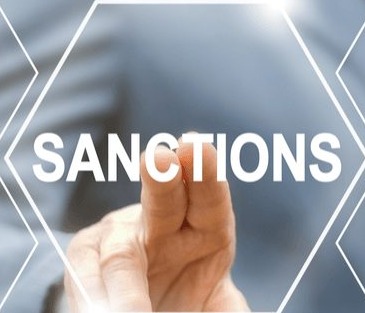Embargo Vs Sanction: Understanding International Trade Restrictions
In the intricate realm of international relations and global trade, the terms "embargo" and "sanction" often surface, casting light on the strategic, economic, and political manoeuvres nations employ to safeguard their interests and enforce global norms. While both are tools of economic coercion and diplomatic pressure, understanding their distinct applications, implications, and nuances is pivotal for businesses and governments navigating the global economic landscape.
This article embarks on a journey to delineate the differences between embargoes and sanctions, offering insights into their types, applications, and the rationale behind their imposition, all while providing a glimpse into how Tookitaki facilitates seamless navigation through the complexities of compliance amidst these international trade restrictions.
What is an Embargo?
Embargoes serve as a powerful tool to impose a comprehensive ban on trade, investment, and economic activities, specifically targeting a particular country or group of countries. These measures are strategically implemented to apply pressure on a nation, compelling it to reconsider its policies, actions, or address potential threats. The scope of an embargo can range from restricting specific goods and services to imposing comprehensive economic barriers affecting multiple sectors.
Types of Embargoes
Embargoes can manifest in various forms, each tailored to address specific concerns and objectives, and can span across trade, financial, and military domains.
Trade Embargo
A trade embargo is a powerful tool used by countries to cut off economic ties with a targeted nation. By restricting the export or import of goods and services, a trade embargo aims to isolate the nation and disrupt its trade relations. This can have a significant impact on the targeted country's economy, as it hinders access to essential goods, technology, and other resources.
Trade embargoes are often imposed as a response to political or security concerns, human rights violations, or non-compliance with international laws and norms. They are designed to put pressure on the targeted nation, forcing it to change its behaviour or policies.
Financial Embargo
Financial embargoes impose restrictions on financial transactions and investments involving a particular country or entity. This may include freezing assets, limiting access to financial markets, and prohibiting investment activities, thereby affecting the economic vitality of the targeted nation.
Military Embargo
Military embargoes restrict the sale, supply, and transfer of military equipment, technology, and assistance to and from the embargoed nation, aiming to curtail its military capabilities and exert pressure without resorting to direct conflict.
What are Sanctions?
Sanctions represent a set of punitive measures, often economic in nature, imposed by one or more countries against a targeted country, entity, or individual. The purpose of sanctions is to hinder specific actions or activities, such as trade or financial transactions, in order to enforce international laws, safeguard national security interests, and uphold ethical and human rights standards. Sanctions can be unilateral, imposed by a single country, or multilateral, enacted by a coalition of countries or international organizations.
Types of Sanctions
Sanctions can be categorized based on their scope, target, and purpose, each designed to exert pressure and achieve specific outcomes without resorting to military intervention.
Economic Sanctions
Economic sanctions restrict the trade of goods and services, limiting access to vital resources, technology, and financial markets, with the aim of destabilizing the economic framework of the targeted entity.
Diplomatic Sanctions
Diplomatic sanctions involve the reduction or elimination of diplomatic ties, such as withdrawing ambassadors, closing embassies, or limiting diplomatic engagements, to express disapproval and isolate the targeted nation diplomatically.
Financial Sanctions
Financial sanctions involve restricting access to global financial markets, freezing assets, and limiting financial transactions to curtail the economic capabilities of the targeted entity or country.
Military Sanctions
Military sanctions restrict the sale and supply of military equipment, technology, and assistance, aiming to diminish the military capabilities and deter aggressive actions of the targeted country.
Sanctions Vs Embargo
While both sanctions and embargoes serve as tools of economic and diplomatic coercion, they differ in scope, application, and intent. Embargoes tend to be comprehensive, prohibiting all forms of trade or other specified activities, whereas sanctions can be more targeted, focusing on specific sectors, entities, or individuals. Embargoes often aim for broad economic impact, while sanctions can be designed to exert pressure on particular individuals or entities without affecting the entire country.
Here are the differences between sanctions and embargoes:
|
Aspect |
Sanctions |
Embargoes |
|
Scope |
Typically targeted, affecting specific sectors, individuals, or entities. |
Comprehensive, affecting all sectors and often the entire country. |
|
Objective |
Aim to change specific policies or actions of a country or entity. |
Aim to isolate and exert maximum pressure on a country or entity. |
|
Duration |
Can be short-term or long-term, depending on policy objectives. |
Often imposed for an extended period to maximize pressure. |
|
Economic Impact |
May have a limited or targeted economic impact. |
Tends to have a widespread and significant economic impact. |
|
Legal Framework |
Governed by various international, regional, and national legal frameworks. |
Often imposed through international consensus, such as the United Nations. |
Examples of an Embargo
Historically, embargoes have been utilized to exert pressure and isolate nations. For instance, the United States imposed a trade embargo on Cuba in 1960, restricting all forms of trade and investment. Similarly, the United Nations imposed an arms embargo on South Africa during the apartheid era, restricting the sale and transfer of arms to and from the country.
Why do Countries Impose Sanctions and Embargoes?
Countries leverage sanctions and embargoes as strategic tools to achieve various diplomatic, economic, and security objectives.
- Promote Behavior Change: Sanctions and embargoes can be used to coerce a country or entity into altering their behaviour, such as discontinuing human rights abuses or ceasing nuclear proliferation.
- Protect National and Global Security: By restricting access to financial resources, technology, and military equipment, sanctions and embargoes aim to safeguard the security interests of the imposing country and the global community.
- Uphold International Laws and Norms: These measures can enforce adherence to international laws and norms, penalizing entities that violate international agreements and treaties.
- Economic Objectives: Sometimes, sanctions and embargoes are utilized to protect the economic interests of a country, such as safeguarding domestic industries from foreign competition.
How Can Tookitaki Help?
Tookitaki, through its innovative compliance solutions, assists businesses in navigating the intricate landscape of global sanctions and embargoes. Leveraging advanced AI-powered screening techniques, Tookitaki's compliance solutions empower institutions to comprehensively screen customers, transactions, and entities against international sanctions lists and embargoes.
.png?width=700&height=700&name=Transaction%20Screening%20(1).png)
By providing real-time monitoring and dynamic risk scoring, Tookitaki enables organizations to swiftly identify and respond to potential violations, thereby minimizing compliance risks. Moreover, its Smart Screening and Dynamic Risk Scoring solutions ensure that financial institutions can adapt to evolving global sanctions and embargoes efficiently, ultimately fostering a secure and compliant operating environment in an ever-changing regulatory landscape.
Here are the capabilities of Tookitaki Solutions:
- Automated Screening: Tookitaki’s platform enables automated screening of clients and transactions against global sanctions and watchlists, ensuring that businesses do not inadvertently engage with sanctioned countries or entities.
- Risk Management: By providing a comprehensive view of potential risks associated with clients and transactions, Tookitaki aids in making informed decisions and ensuring compliance with sanctions and embargoes.
- Regulatory Compliance: Tookitaki ensures that businesses remain compliant with evolving regulatory requirements related to AML, CFT, and sanctions compliance, mitigating the risk of regulatory penalties.
- Enhanced Due Diligence: The platform facilitates enhanced due diligence processes, ensuring that businesses can accurately assess and manage risks associated with clients and counterparties.
Final Thoughts
Navigating through the complexities of sanctions and embargoes demands a robust, agile, and comprehensive compliance framework. While these restrictive measures play a pivotal role in safeguarding global security and upholding international norms, businesses must ensure that they remain compliant, mitigating risks and safeguarding their operations against potential pitfalls. Leveraging technology, like the solutions provided by Tookitaki, businesses can efficiently navigate through the compliance landscape, ensuring that they adhere to global regulations while continuing to facilitate legitimate and compliant trade and transactions.
Frequently Asked Questions (FAQs)
What is a Trade Embargo?
A trade embargo is a comprehensive prohibition on trade and other commercial activities with a particular country or entity, aimed at isolating it economically and politically.
What are Trade Sanctions?
Trade sanctions are restrictive measures imposed on specific sectors or types of trade to penalize and exert pressure on a particular country or entity without a complete trade ban.
Is an Embargo an Economic Sanction?
Yes, an embargo is a type of economic sanction, albeit more comprehensive, restricting all forms of trade and commercial activities with the targeted entity.
Is Arms Embargo a Type of Sanction?
Yes, an arms embargo is a specific type of sanction that restricts the sale, transfer, and supply of military equipment, technology, and assistance to and from the targeted country or entity.
Anti-Financial Crime Compliance with Tookitaki?






